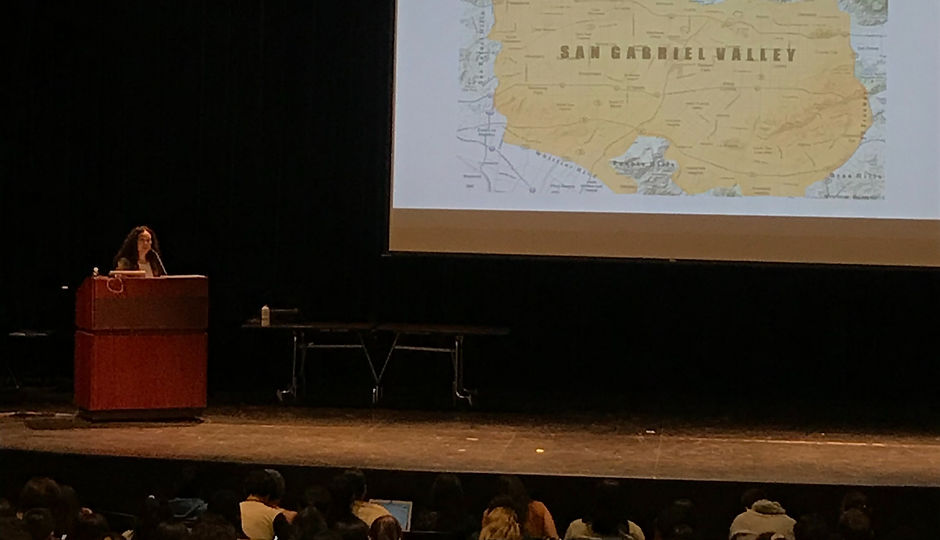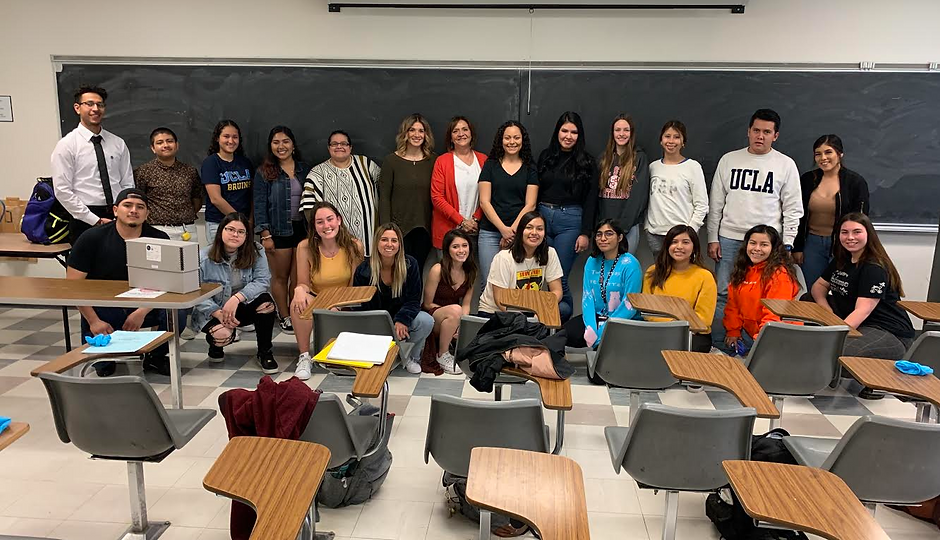
Natalie Santizo, Ph.D.
Assistant Professor in Chicana and Chicano Studies, San Diego State University

About Me
Natalie Santizo is an interdisciplinary historian of U.S. history. Her experiences with foodways—the production, consumption, and distribution of foods—have critically shaped her research interests in history, food studies, and geography. She is currently an Assistant Professor at San Diego State University. Prior to SDSU, she held a UC President's Postdoc at UC Merced under the Department of Critical Race & Ethnic Studies. Natalie obtained her Ph.D. in Chicana/o and Central American Studies from UCLA.
Research Interests
Race & Ethnicity | Food Studies | Racial Geographies | 20th Century U.S. History | Public History
Education
UCLA
Ph.D. Chicana/o and Central American Studies, 2022
ASU
M.S. Justice Studies, 2016
USC
B.S. Sociology, 2014
B.S. Psychology, 2014
Minor, American Studies & Ethnicity
Book Project
Mexican Foodways in the SGV: Racial Formation, Regional Identity, and Placemaking, 1900-1950
Natalie’s current book project explores twentieth century Latinx foodways—the production, consumption, and distribution of foods and food laborers—to piece together a social history of Latinx communities in Southern California. She addresses gaps in 20th century United States historiography by centering a foodways lens in recovering histories of survival of marginalized Chicanx communities in the San Gabriel Valley of Southern California. Her book takes a mixed-methods approach (archival research, GIS mapping, content analysis, and oral history) to create two interventions: 1. Foregrounding public history in piecing together Chicanx social histories and 2. Advancing the framework of “critical latinx foodways,” a methodological approach to recovering fragmented histories that expands far beyond this region. Natalie’s research has been supported by the UC President's Postdoctoral Fellowship, the Ford Foundation, the Institute of American Cultures, and the Huntington Library.
Published Work
Chapter in- Culinary Mestizaje: Racial Mixing, Migration, and Foodways in the U.S., eds. Rudy P. Guevarra Jr. and Felipe Hinojosa, University of Texas Press.
Forthcoming, 2024
Journal Article- "Rasquache Mapping: Enhancing Digital Mapping Through Community Knowledges," GeoHumanities, Forthcoming.
Forthcoming, 2024
Book Review- Food Across Borders, eds. Matt Garcia, E. Melanie DuPuis and
Gastronomica
Winter 2018
Book Review- Mexican Origin Foods, Foodways and Social Movements- Decolonial Perspectives, eds. Devon Peña, Luz Calvo, Pancho McFarland, and Gabriel R. Valle
Aztlan
Spring 2019
Book Review- Flavors of Empire: Food and the Making of Thai America by Mark Padoongpatt
June 2019
Grant: Digitizing the Education Movimiento
Santizo was recently awarded a $300,000 to digitize the Chicana/o Collection at San Diego State University in collaboration with archivist Erika Esquivel. This 36-month project, funded by the Council on Library and Information Resources will help digitize the collection in its entirety, including scrapbooks, correspondence, newsletters, syllabi, and more.

Teaching

Chicana/o History (350B | SDSU)
Fall 2023

History of the United States (141B | SDSU)
Fall 2023

Introduction to Chicana/o History: Guest Lecture | UCLA
"Los Angeles and Its Suburbs: Local History, Agriculture, and Why It Matters." Guest lecture to our 500 student-enrolled course.

Racial Geographies | UCLA
Fall 2019

Chicana/o History, Honors Section
Archival Workshop | UCLA
Winter 2020
Get in touch for more information about these and other course offerings.
Curatorial Experience

Revolution in the Fields: Dolores Huerta
Smithsonian Institution Traveling Exhibition Services
SITES Fellow
Working closely with a team of curators and directors at Smithsonian Institution Traveling Exhibition Services (SITES), Natalie created the audio storyboard for the 2019-2020 national exhibition: Revolution in the Fields: Dolores Huerta. Natalie conducted archival research for historic images and accounts for the exhibition, working with national archives as well as online archives from the United Farmworkers Union. She also contributed edits, changes, and revisions with an internal team at SITES for the exhibition script. Natalie helped transcribe an oral history with Dolores Huerta in English and Spanish to be included in the exhibition's audio and iOS application, where audio from the oral history can be listened to.
Image retrieved from Smithsonian Institution
Academic Conferences
April 2023
Organization of American Historians
“Mexican Tiendas in Hicks: Entrepreneurship in a Mexican Barrio,
1900-1972” Panel, Organization of American Historians
Conference, Los Angeles, CA
November 2022
American Studies Association
Roundtable Participant.
“The Kitchen is on Fire: A Roundtable on Critical Food Studies
Past and Futures,” Participants: Kyla Tompkins, Anita Mannur,
Krishnendu Ray, Mark Padoongpatt, Natalie Santizo, American
Studies Association Conference, New Orleans, Louisiana
November 7- November 10, 2019
American Studies Association
"Critical Latinx Foodways." Panel: Mapping Latinx Histories: Spaces of Containment, Displacement, and Resistance. Panelists: Oscar Gutierrez, University of California, San Diego; Jose Santillana, University of Minnesota, Twin Cities; Kimberly Soriano, University of California, Santa Cruz; Natalie Santizo, University of California, Los Angeles. Chair: Israel Reyes, Dartmouth College.
By engaging in critical Latinx geographies, this panel explores crucial gaps in conversations of environmental justice, gentrification, criminalization and food studies. This panel interrogates how racialized geographies have shaped Latinx communities in the state of California. In the face of violence and erasure of Latinx histories, this panel envisions alternative futures grounded in resistance. Taking up a variety of approaches of mapping Latinx histories, we seek to place these issues in conversation to highlight their intimacies as attempts to erase resiliency across communities.
April 3 - April 6, 2019
Washington, D.C
American Association of Geographers
"Mapping Latinx Foodways." Panel: Latinx Geographies, Sponsored by the Latinx Geographies Specialty Group and Black Geographies Specialty Group. Panelists: Juan Herrera, University of California, Los Angeles; Kimberly Miranda, University of California, Los Angeles; Natalie Santizo, University of California, Los Angeles.
In the face of a political movement in the USA that insists that all Latinx are perpetual foreigners and suspect, and that we do not have claims to political autonomy and collective voice, what histories need to be lifted up? What archives do we need to excavate, or create? What taken-for-granted relations between people and place need to be rethought? In this, Latinx Geographies can draw on conjunctural moments that bring forth collective action, rather than assuming that they are a result of somebody else’s political program.
March 22-26, 2019
Hartford, Connecticut
National Council for Public History
"Reconstructing Community Archives in Southern California through Mexican American Foodways." Panelists: Anneleise Azua, University of Texas at Austin; Laura Oviedo, Texas A&M University; Natalie Santizo, University of California, Los Angeles. Panel: Latina Historians Expanding the Archives, Facilitator: James Deutsch, Smithsonian National Museum of American History.
This session featured three Latina scholars engaged in repair work that seeks to expand local and national archival collections in hopes of better representing their immediate Latinx communities in the US Southwest and the greater American Latinx community. Not only does their work make use of often overlooked and marginalized voices and texts in the archives, it seeks to actively expand community records and collections through oral histories and community partnerships.
July 22 - July 24, 2018
Washington, D.C
Latina/o Studies Association
"Mapping Latinx Foodways: Futures of Food Studies." Panel: Sites of Public Spectacle. In this paper, I discuss the ways food informs my work as a Chicana/o Studies scholar, and how foodways offers a fresh perspective within the field of Chicana/o Studies. I also discuss the ways in which ethnic studies can impact food studies by offering an intersectional approach to the study of food.




